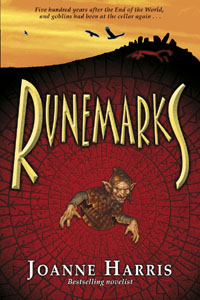

Interview: Joanne Harris
by Rebecca Davies
 Since the incredible success of her novel Chocolat, Joanne Harris has become a household name. She says it has not really changed her: "I don't try to respond, because I'm not sure there is an appropriate response I could have. I just keep doing the things I've always done as best I can." With the release of her new book Runemarks it's clear she's a busy woman, but she still makes time to answer my questions in the middle of preparing for a transatlantic flight. Joanne Harris lists among her influences such giants of magical realism and fantasy as Angela Carter and Mervyn Peake, so I began by asking her about her views of genre.
Since the incredible success of her novel Chocolat, Joanne Harris has become a household name. She says it has not really changed her: "I don't try to respond, because I'm not sure there is an appropriate response I could have. I just keep doing the things I've always done as best I can." With the release of her new book Runemarks it's clear she's a busy woman, but she still makes time to answer my questions in the middle of preparing for a transatlantic flight. Joanne Harris lists among her influences such giants of magical realism and fantasy as Angela Carter and Mervyn Peake, so I began by asking her about her views of genre.
RD: Your books are well known for containing elements of the fantastical. Would you describe your work as magical realism?
JH: Not really. I don't really like those generalizations. Either you believe magic is real, or you don't. Fantasy tends to be easier to classify as it usually relates to imaginary worlds and universes. Most of my stories have some kind of base in fact, but fundamentally I try for emotional realism; the details may be invented, but if the feelings are true (be they rage, love, or the desire for revenge), then the characters will come to life and the plot, however unlikely, will seem more convincing to the reader.
RD: Food has been central to the themes of your work. Why is this? Is it because food is a fundamental and important part of human experience?
JH: It's one of the very few things that all cultures can share and understand, and as such can be a useful indicator of personality and attitude. I think tastes and smells are particularly evocative to us because as newborns we first experience the world through those two senses. That means that our emotional response to a taste or a smell (think of Proust and his lime-blossom tisane) can act upon us at a very powerful, subconscious level. This is also true in literature, folk tale and mythology, where food and drink have played an important symbolic role for centuries.
RD: What do you believe is the relationship between food and the sense of place so important to magical realism?
JH: In more recent literature, such references provide a handy means of reflecting different cultures and distant places. It's also a very useful indicator of personality. Eating habits provide us with an insight into a person's background, character, family and upbringing, as well as their general attitude to life and to other people. Besides, readers understand food; in our increasingly diverse and multicultural society, eating remains one of the very few experiences we all have in common; a pleasure, a comfort and a means of expression.
RD: Your latest novel is classified as Young Adult. Is this a new departure for you? Do you think that writing for a younger audience is a natural progression for an author who uses fantastical elements in her work?
JH: I don't make these classifications; the publishers do. I think Runemarks is suitable for anyone who remembers the experience of being a certain age, and wanting to experience the miraculous first-hand.
RD: You'd rather be without the marketing labels?
JH: I find it a little sad that to the industry, only young people are allowed to feel this way . . .
RD: Runemarks is a slight departure from your previous books. What does the future hold for you? Can we expect to see more of your past themes and style, or are you planning something different?
JH: I don't think I could write in any other style but my own; it has evolved over many years, and whatever the topic, my work is always likely to reflect my preoccupations and enthusiasms. But I do like exploring and trying things out, and I'm always in the market for new ideas . . .
Rebecca Davies was talking to Joanne Harris, author of The Evil Seed (1989), Sleep, Pale Sister (1993), Chocolat (1999), Blackberry Wine (2000), Five Quarters of the Orange (2001), Coastliners (2002), The French Kitchen (2002), Holy Fools (2003), Jigs & Reels (2004), The French Market (2005), Gentlemen and Players (2005), The Lollipop Shoes (2007), and, most recently, Runemarks (2007). With additional material taken with kind permission from www.joanne-harris.co.uk.
Story Copyright © 2007 by Rebecca Davies. All rights reserved.
Previous: The Mouse, the Bird and the Sausage by The Brothers Grimm
About the author
 It has been alleged that Rebecca Davies is actually a talking squirrel and not a perfectly formed young lady. Either way, she knows lots about writing and editing and caching nuts and berries. She lives somewhere in the middle of England up a tree or in a warren.
It has been alleged that Rebecca Davies is actually a talking squirrel and not a perfectly formed young lady. Either way, she knows lots about writing and editing and caching nuts and berries. She lives somewhere in the middle of England up a tree or in a warren.
Feel free to write haiku for her. She likes that, as well as zombies and dinosaurs. She went to a university in Oxford. No, not that one.